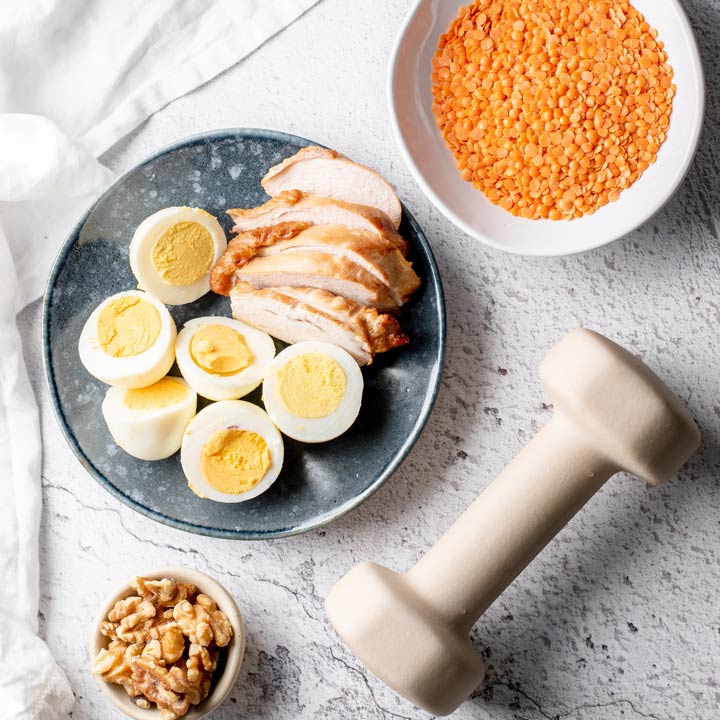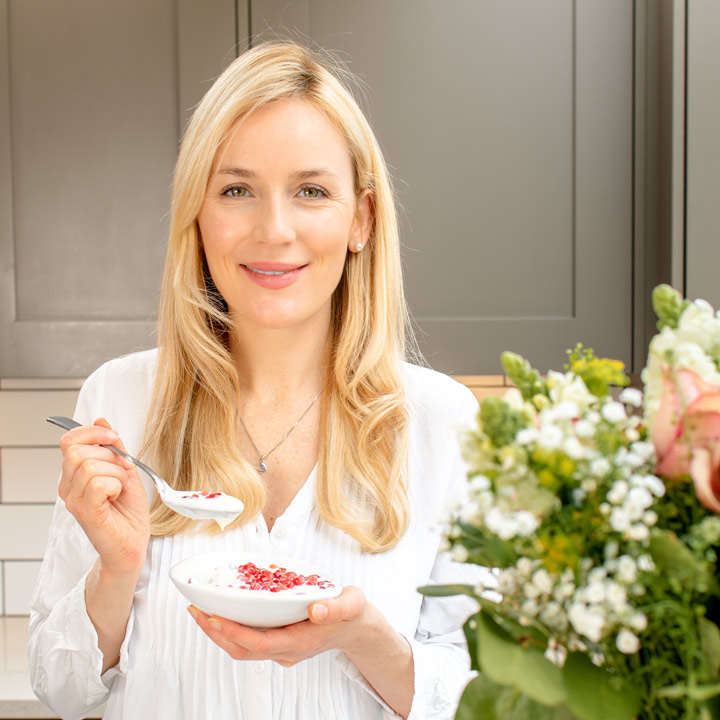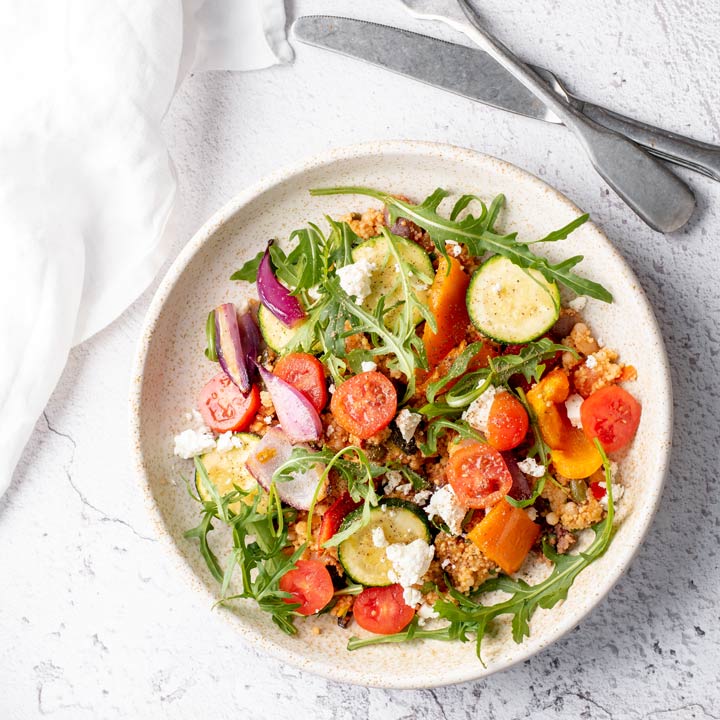The lead-up to menopause is a challenging time, with 90% of women experiencing physical symptoms and 55% experiencing psychological symptoms (1). Hot flushes, insomnia, weight gain and mood swings, are just to name a few that have been associated with entering this stage of life. However, with some simple tweaks to our diet and lifestyle, it’s possible to navigate this hormonal shift, lessening the burden of bothersome symptoms…
1. Enjoy foods rich in phytoestrogens
Some plant-based foods such as soya and milled flaxseeds are rich sources of ‘plant oestrogens’ known as phytoestrogens. When consumed in regular and sufficient amounts, they may reduce the intensity of some menopausal symptoms such as hot flushes (2,3,4). Maximise the power of phytoestrogen-rich foods by consuming these several times a day, rather than in one large dose. It can take up to 2-3 months before benefits may be seen, with the effectiveness differing between individuals (3). Around two servings of soya foods daily appear to be the optimal dose, try tofu, tempeh, natto, soy milk, soy yoghurt, and even edamame (5). Whipping up our own soy milk is easier than it first seems. With just 2 ingredients and the helping hand of Panasonic’s slow juicer, we can enjoy that delicious yet phytoestrogen-rich beverage within minutes. There’s also a wealth of soya-based recipes to try, from Tofu Skewers to Tofu and Spinach Meatballs, all of which can be easily prepared using the Panasonic Combi Oven.
2. Embrace the power of protein and strength training
As many as 50% of women report menopausal weight gain, with much of this accumulating around the middle (6). This may be in part due to a loss of muscle mass, which is not only denser than fat but burns more calories at rest. On average 8% of muscle mass is lost every decade after the age of 40, therefore engaging in regular strength training is key (7). The most effective way to hold onto and possibly even build muscle is to consume sufficient protein spread evenly throughout the day (8). Enjoy protein-rich foods in little and often amounts, such as lean meats, fish, eggs, dairy, soya, pulses, nuts and seeds.
3. Boost intake of bone-friendly nutrients
The drop in oestrogen accompanying menopause can accelerate bone loss. This increases the risk of osteoporosis which is characterised by weakened and fragile bones. Meeting our daily requirements of bone-friendly nutrients such as calcium and vitamin D may help reduce this rate of bone loss. Dairy products such as milk, yoghurt and cheese are a top source of calcium. But it’s totally possible to also enjoy plant-based sources including fortified milk alternatives, tofu, green leafy vegetables, nuts, seeds and dried fruit.
Vitamin D works synergistically with calcium to maintain strong bones. Whilst oily fish, eggs and UV-exposed mushrooms are a source, if we were to rely on diet alone we would obtain less than one-third of our daily vitamin D requirements. As sunlight is the best source of vitamin D, those living in countries in the northern hemisphere may be at risk of deficiency during the winter months. This means that some may require vitamin D supplementation to meet the European recommended daily intake of 15µg (600 IU) (9).
4. Enjoy a heart-friendly diet
Menopause can come with an increased risk of heart disease, therefore enjoying a nourishing diet and active lifestyle can be a cornerstone for supporting a healthy heart (3). A heart-friendly diet comprises of plenty of fibre-rich plant-based foods including wholegrains, pulses, fruit, vegetables, nuts and seeds. Research suggests that following a more Mediterranean pattern of eating which has an additional focus on healthy monounsaturated fats from olive oil and plenty of omega-3 fats from oily fish, may be particularly effective for supporting overall cardiovascular health (10).
5. Be mindful of caffeine and alcohol
When oestrogen levels start to tank, mood changes and sleep disturbances may kick in. With irritability, anxiety and tearfulness being common menopausal symptoms, who wouldn’t want to reach for that glass of wine to calm those nerves? Whilst there’s nothing wrong with enjoying alcohol and caffeine in moderation, overconsumption can exacerbate symptoms including hot flushes (11). But there’s no need to miss out, try using Pansonic’s slow juicer to make nutrient-dense-yet delicious mocktails such as this non-alcohol Pineapple Passion cocktail or this Mandarin, Carrot, Red Pepper juice. When it comes to caffeine, it’s possible to cut back without the headache. Gradually tapering consumption can minimise that shock to the body. Instead, try experimenting with some flavoursome caffeine-free fruit and herbal teas.
References:
1.https://gremjournal.com/wp-content/uploads/2021/12/07_Panay_GREM3-2021.pdf
2.https://pubmed.ncbi.nlm.nih.gov/22433977/
3.https://www.bda.uk.com/resource/menopause-diet.html
4.https://www.menopause.org/for-women/menopause-faqs-hot-flashes
5.https://pubmed.ncbi.nlm.nih.gov/22433977/
6.https://thebms.org.uk/wp-content/uploads/2023/06/19-BMS-TfC-Menopause-Nutrition-and-Weight-Gain-JUNE2023-A.pdf
7.https://www.abbott.com/corpnewsroom/nutrition-health-and-wellness/5-ways-to-stay-strong-as-you-age.html
8.https://jissn.biomedcentral.com/articles/10.1186/s12970-017-0177-8
9.https://efsa.onlinelibrary.wiley.com/doi/10.2903/j.efsa.2016.4547
10.https://www.ncbi.nlm.nih.gov/pmc/articles/PMC4339461/
11.https://pubmed.ncbi.nlm.nih.gov/25051286/
























